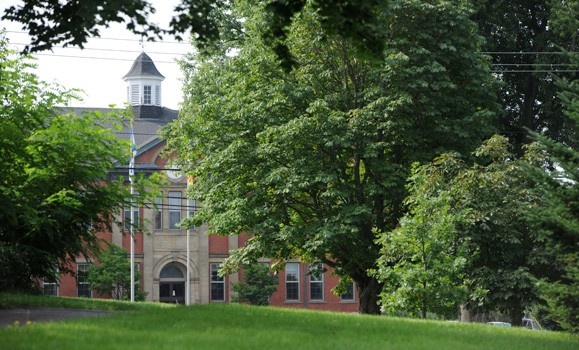In some ways, today isn’t all that different in Truro-Bible Hill than any other Tuesday following Labour Day: a close-knit, vibrant campus comes to life as employees return to work, first-year students continue their orientation week and returning students drop by campus to finish off their errands before classes resume.
But the signs of an exciting new future are also present: a candy greeting on every employee’s desk, new shield-adorned welcome signs at campus entrances, and a ram mascot named Rocky now proudly sporting a black and gold look.
Today is the first formal day of operation for Dalhousie’s Faculty of Agriculture and the university’s new Agricultural Campus. The merger between Dalhousie and Nova Scotia Agricultural College officially took effect this past Saturday.
Dalhousie President Tom Traves was in Truro on Sunday, welcoming the faculty’s new students as part of orientation activities.
“As the first class to arrive on campus following the merger you will be witness to some amazing new things as we build a national centre of excellence for research and innovation in agriculture; as we expand academic programs and create new ones; and as we create new learning and research opportunities that will revolutionize your educational experience,” Dr. Traves told the students.
See also:
With the merger, Dalhousie becomes the only university in Atlantic Canada to offer a specialty in agricultural science, combining the experience of one of the oldest universities in Canada with the experience of one of the oldest centres for agricultural education and research in Canada, both dating back to the 19th century.
With the addition of the Agricultural Campus, Dalhousie now offers programs in Halifax, Truro, Yarmouth and Saint John.
Combining expertise, expanding opportunity
Merger discussions between Dalhousie and NSAC were officially announced in May 2011, with a tentative agreement between Dal and the Province of Nova Scotia reached this past March. Since that point, employees in both Truro-Bible Hill and Halifax have been working hard to integrate essential systems for the September 1 date.
“Making this merger date wouldn’t have been possible without the commitment and enthusiasm of everyone who worked on it—both at Dal’s Halifax campuses and our new Agricultural Campus,” says Susan Spence Wach, who led the transition process. “We’re so grateful for their hard work, because it has enabled us to get to this exciting moment: when the inspiring possibilities of this merger start to transform into reality.”
See also:
With academic calendar for 2012-13 already set, students won’t notice any changes in their programs this year, and there will be many systems and processes that will take more time to fully integrate. But as the Faculty of Agriculture moves forward, students and faculty can expect to see new interdisciplinary programs, increased course offerings, expanded research opportunities and other developments that will attract more local, national and international students and faculty to Truro-Bible Hill.
Strengthening community roots
Moreover, the merger enables Dal to leverage an expanded range of research and expertise to advance economic and agricultural development in Truro-Bible Hill, the Annapolis Valley, and other areas where the faculty plays a key role. The roots of these community connections—so important to NSAC’s mission—will gain strength in the merger.
“From the research and development standpoint, there is a big positive when two institutions like these join forces,” says Dick Huggart, NSAC alumnus and former deputy minister of agriculture for Nova Scotia. “R&D is incredibly important to the future of agriculture. It gives us the ability to meet emerging challenges and is critical to a balanced food supply for a hungry world.
��
“NSAC has traditionally has close ties with the agriculture industry. It’s so important that this continues – the collaboration, cooperation and communication.”
See also:
Jo Ann Fewer, CEO of Perennia and former executive director of the Colchester Regional Development Agency, is excited about the opportunities for Truro and Bible Hill in the merger.
“Dalhousie’s new Truro-Bible Hill campus may attract some of Dalhousie’s other disciplines to the community, so Truro-Bible Hill can benefit from that,” she says. “The community will also benefit from the strength of Dalhousie’s national and global exposure. The more people who are exposed to our community, the more aware they are of what makes our community unique and special.”
A new community joins Dalhousie
Those words—unique and special—come up often when discussing NSAC, and there’s no question that one of the school’s greatest strengths has been its tight-knit campus community. Dalhousie wants to keep it that way, and the Agricultural Campus will undoubtedly have a unique place within the university: it will host extensive local services and supports, and even maintain its own sports teams that will compete in the Atlantic Collegiate Athletic Association.
“What is perhaps most exciting about this day is the opportunity to celebrate all that makes the new Faculty of Agriculture special—notably the people who made NSAC such a success for so many years, the small-campus culture, and the community in which the campus lives and thrives,” says Dr. Traves.
“Today, Dalhousie gains more than just a new faculty and campus, more than an incredible community of students, faculty and staff. We also take the reins of a long, celebrated history of agricultural education, research and outreach. The Faculty of Agriculture will not only honour that history, but continue its important work and expand its impact across the province, the region, the country and beyond.”
More on the Faculty of Agriculture
- Dal News:
- Video:
- Dal News:
- Web: Visit the and websites
- Dal News:

